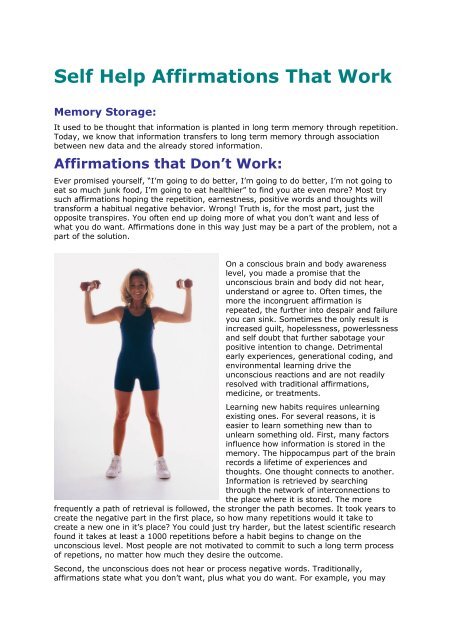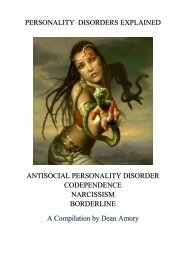CODEPENDENCE - DEAN AMORY
PERSONALITY DISORDER, CODEPENDENCE, RELATIONSHIPS, PSYCHOLOGY, LOVE, MATRIMONY, LIFE, LIVE,
PERSONALITY DISORDER, CODEPENDENCE, RELATIONSHIPS, PSYCHOLOGY, LOVE, MATRIMONY, LIFE, LIVE,
Create successful ePaper yourself
Turn your PDF publications into a flip-book with our unique Google optimized e-Paper software.
Self Help Affirmations That Work<br />
Memory Storage:<br />
It used to be thought that information is planted in long term memory through repetition.<br />
Today, we know that information transfers to long term memory through association<br />
between new data and the already stored information.<br />
Affirmations that Don’t Work:<br />
Ever promised yourself, “I’m going to do better, I’m going to do better, I’m not going to<br />
eat so much junk food, I’m going to eat healthier” to find you ate even more? Most try<br />
such affirmations hoping the repetition, earnestness, positive words and thoughts will<br />
transform a habitual negative behavior. Wrong! Truth is, for the most part, just the<br />
opposite transpires. You often end up doing more of what you don’t want and less of<br />
what you do want. Affirmations done in this way just may be a part of the problem, not a<br />
part of the solution.<br />
On a conscious brain and body awareness<br />
level, you made a promise that the<br />
unconscious brain and body did not hear,<br />
understand or agree to. Often times, the<br />
more the incongruent affirmation is<br />
repeated, the further into despair and failure<br />
you can sink. Sometimes the only result is<br />
increased guilt, hopelessness, powerlessness<br />
and self doubt that further sabotage your<br />
positive intention to change. Detrimental<br />
early experiences, generational coding, and<br />
environmental learning drive the<br />
unconscious reactions and are not readily<br />
resolved with traditional affirmations,<br />
medicine, or treatments.<br />
Learning new habits requires unlearning<br />
existing ones. For several reasons, it is<br />
easier to learn something new than to<br />
unlearn something old. First, many factors<br />
influence how information is stored in the<br />
memory. The hippocampus part of the brain<br />
records a lifetime of experiences and<br />
thoughts. One thought connects to another.<br />
Information is retrieved by searching<br />
through the network of interconnections to<br />
the place where it is stored. The more<br />
frequently a path of retrieval is followed, the stronger the path becomes. It took years to<br />
create the negative part in the first place, so how many repetitions would it take to<br />
create a new one in it’s place? You could just try harder, but the latest scientific research<br />
found it takes at least a 1000 repetitions before a habit begins to change on the<br />
unconscious level. Most people are not motivated to commit to such a long term process<br />
of repetions, no matter how much they desire the outcome.<br />
Second, the unconscious does not hear or process negative words. Traditionally,<br />
affirmations state what you don’t want, plus what you do want. For example, you may


















